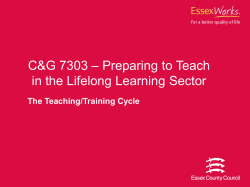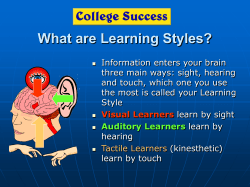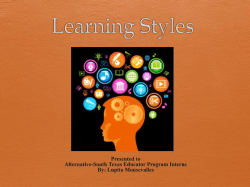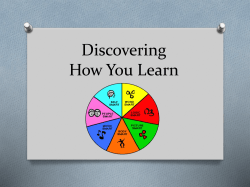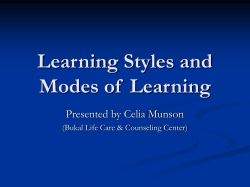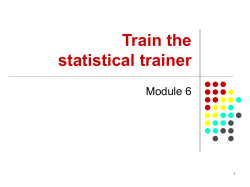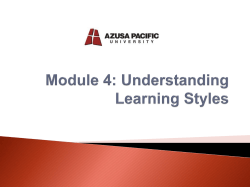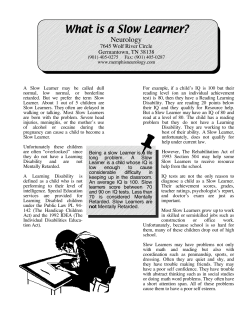
Learning styles questionnaire lesson plan
Sample Lesson Plan ! LINC 4 Education TOPIC: Effective Learning LEVEL: LINC 4 (CLB 4, 5) DURATION: 5 hours Topic Outcomes: — — O & give simple informal advice regarding effective learning techniques and strategies ask for and give information about personal learning strategies understand factual details and some implied meanings in simple advice and suggestions use a complex reference text ? write a description of own experiences in the past and plans for the future, giving reasons Planning THEME: Vocabulary and Expressions: learning styles, visual, auditory, tactile, academic subjects, lecture, keep your nose to the grindstone, learn something by heart, It’s a snap! Grammar: modals: could, should, might, must for suggestions questions: wh-, yes/no, embedded Pronunciation: intonation patterns in wh-, yes/no, and embedded questions Computer Skills: Create a New Presentation, Font, Font Alignment, Insert Bullets and Numbering, Insert ClipArt, Show a Presentation Software: Power Point Resources: • • New Interchange 3: Unit 8, p. 48, “Learning to Learn” (audio tape) instructor-made handouts: 1. I Learn Best When… 2. Learning Styles Questionnaire 3. Learning Styles Score Sheet 4. Modals for Suggestions Procedures: Presentation: Learning Styles Instructor introduces the topic of learning styles and new vocabulary: learning styles, visual learner, auditory learner, tactile learner, and gives examples of activities preferred by each type of learner. (See the Strategies for Learners section of this document for examples.) Warm-up: Learning Style Activities Listening Task: Strategies for Learning New Vocabulary Pre-listening: Class discusses ways to learn new vocabulary in another language. Listening: Class listens to interviews (New Interchange 3, p. 48) of people describing the techniques they use to learn new words in a second language. Learners recall the techniques mentioned in the interviews. LINC 1-5 LINC 4 Instructor writes three headings on the board or on chart paper: Visual Learners, Auditory Learners, Tactile Learners. The class is divided into three groups. Each group brainstorms other types of learning activities or study techniques suited to one of the learning styles and writes them under the proper heading. Class discusses the activities listed. 77 Sample Lesson Plan ! LINC 4 Speaking Task: I learn best when… In pairs, learners discuss the questions in Handout 1 showing different ways of learning and the ways they prefer. Reading Task: Learning Styles Questionnaire/ Learning Styles Score Sheet Pre-reading: Instructor introduces the idea of a learning styles questionnaire. Learners predict questions that may be used to determine learning style. Reading: Learners skim the questionnaire on Handout 2 to check if their predictions are correct. Learners read for general idea. Writing Task: Learners answer the questions for self and complete the Learning Styles score sheet on Handout 3 to determine what kind of learner they are. Pronunciation: Intonation in yes/no and wh- questions Using questions from the speaking task (Handout 1), the instructor models intonation patterns for yes/no and wh- questions. Learners listen and repeat. Grammar: Modals for Suggestions Class discusses the differences in meaning and appropriateness of the different modals for different situations. Learners complete the dialogue about learning strategies on Handout 4 using the appropriate modals, discuss the idiomatic expressions in the dialogue, and practice the dialogue with a partner. Learners then interview a new partner and give suggestions using the appropriate modals. Assessment: Assessment is based holistically on overall effectiveness in giving and responding to suggestions and analytically on intonation in yes/no questions, correct use of modals, and techniques and expressions for indicating agreement or disagreement. Writing Task: Personal experience Pre-writing: Learners create a list (in point form) of strategies learned in the lesson. Writing: Learners write a paragraph describing own experience of learning English and plans for implementing new strategies in the future, giving reasons. Assessment: Assessment is based holistically on overall effectiveness of the writing exercise and analytically on accuracy of grammar, adequacy of vocabulary for the purpose, and cohesion. Computer Task: Presentation about learning strategies LINC 4 Learners prepare a short presentation about strategies for learning English or any other skill using PowerPoint. 78 Planning LINC Curriculum Guidelines Sample Lesson Plan ! LINC 4 I work with a small group of learners I listen to a lecture rather than read the same material in a textbook I work under stress I am relaxed I take things apart and put them back together again I learn best when… I repeat the words out loud rather than write them down Planning Handout 1: I Learn Best When…1 I read about things I work with my hands someone explains to me what I don’t understand I work at my own speed I write things down I talk about things I move around and keep active In pairs, discuss the following questions: • Think about a time when you learned to do something. Do not include learning English. What did you learn? How did you learn it? What helped you to learn? What interfered with your learning? • • Do you use more than one learning style at different times? Give examples. How do you learn best? LINC 4 1 Adapted from Florence Guy, Working Skills for Immigrant Women (Toronto: Working Skills Centre of Ontario, 1990), p. 60-91. LINC 1-5 79 Sample Lesson Plan ! LINC 4 Handout 2: Learning Styles Questionnaire1 LINC 4 What Type of Learner Am I? Sometimes Seldom 1. I remember information better from a lecture with explanations and discussion. 5 3 1 2. I learn information more easily if it is written on the board. 5 3 1 3. I like to take notes when I read something. 5 3 1 4. I like when models and posters are used in the classroom. 5 3 1 5. I need verbal explanations of diagrams and graphs. 5 3 1 6. I like to work with my hands. 5 3 1 7. I remember best when I write things down. 5 3 1 8. I can follow directions on maps. 5 3 1 9. I do better at academic subjects by listening to lectures and tapes. 5 3 1 10 I like to have something in my hand when I’m learning. 5 3 1 11. I learn to spell better by repeating the words out loud than writing them down. 5 3 1 12. I understand the news better by reading it in the newspaper rather than listening to the radio. 5 3 1 13. I chew gum or snack when I’m studying. 5 3 1 14. I remember things better when I picture them in my head. 5 3 1 15. I enjoy learning how something works by taking it apart and putting it back together again. 5 3 1 16. I would rather listen to a lecture than read the same information in a textbook. 5 3 1 17. I am good at solving jigsaw puzzles. 5 3 1 18. I would rather listen to the news on the radio than read it in a newspaper. 5 3 1 19. I prefer to get information by reading about it. 5 3 1 20. I enjoy classes with physical activity and movement. 5 3 1 21. I follow verbal directions better than written ones. 5 3 1 1 80 Often Adapted from Human Resources Development Canada, Canada Prospects 1998 (Ottawa: Canada Career Consortium, 1998), p. 4. Planning LINC Curriculum Guidelines Sample Lesson Plan ! LINC 4 WHAT IS YOUR LEARNING STYLE? Each of the numbers below is that of a statement listed in the questionnaire “What Type of Learner Am I?” Beside it, put the number that you circled for that statement. When you are done, add up the points in each column. VISUAL AUDITORY TACTILE Statement: 2. _____ 1. _____ 4. _____ Statement: 3. _____ 5. _____ 6. _____ Statement: 8. _____ 9. _____ 7. _____ Statement: 12. _____ 11. _____ 10. _____ Statement: 14. _____ 16. _____ 13. _____ Statement: 17. _____ 18. _____ 15. _____ Statement: 19. _____ 21. _____ 20. _____ TOTALS _____ _____ _____ Planning Handout 3: Learning Styles Score Sheet1 The column with the highest score indicates your most preferred learning style. It is possible to have another column with a high score, which means that you learn in more than one way. This is common. Many people have a mix of learning styles. LINC 4 1 Adapted from Canada Prospects 1998, p. 4. LINC 1-5 81 Sample Lesson Plan ! LINC 4 Handout 4: Modals for Suggestions Anh asked her instructor for advice about using better strategies to learn English. Her instructor told her about several helpful strategies. Complete the dialogue using could, should, might, or must. A: I would like to learn more quickly. Sometimes I feel like I'm not doing things the best way. I: Well, everyone learns differently, and not all strategies work for everyone. There are some strategies you _________________ try, Anh. I've noticed that you don't write notes in class. Maybe you ________________ write notes as you listen. Many students find it helpful to underline new words or use a highlighter. You _________________ use a highlighter. A: I have problems remembering grammar and spelling. I: Grammar and spelling are difficult. You ________________ try to learn the correct forms by heart. It's the only way to remember. You ______________ do the homework exercises, and you __________________ ask questions in class when you don't understand something. A: I don't always understand the vocabulary. I: You ______________ use a good dictionary for new words. If you want to remember the new vocabulary, you _________________ use it in class and outside class, if possible. You ______________ write the new word several times in your notebook. Or you _______________ say it out loud to yourself. A: Speaking makes me nervous. I don't want to make mistakes. I: Anh, everyone makes mistakes. You _________________ speak more if you want to improve. You _____________ participate in group discussions in class. Maybe you ______________ practice outside class with a friend. Learning English is a snap if you just keep your nose to the grindstone and don’t get discouraged. Interview a partner. Ask your partner these questions: 1. Is spelling difficult for you? 2. Do you have difficulty learning new grammar? 3. Do you have problems learning new vocabulary? 4. Are you nervous about speaking English? 5. Do you think you should try new learning strategies? Why or why not? LINC 4 For every yes answer, suggest some good strategies to your partner. Use appropriate modals. 82 Example: A: Yes, spelling is difficult for me. B: You could write out new words 10 times in your notebook. Planning LINC Curriculum Guidelines
© Copyright 2025
